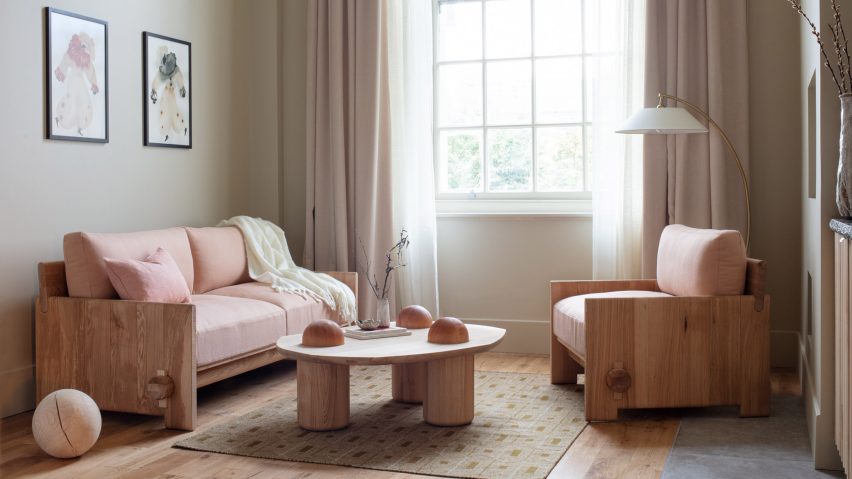Reclaimed architectural timber and wood from a felled street tree form the furnishings of two hotel suites that designer Jan Hendzel has revamped for London's Town Hall Hotel in time for London Design Festival.
Suites 109 and 111 are set on the first floor of the Town Hall Hotel, which is housed in a converted Grade II-listed town hall in Bethnal Green dating back to 1910.
Each of the apartment-style suites features a living room with a kitchen alongside a bedroom and en-suite, which Hendzel has outfitted with bespoke furnishings. Like all of the furniture maker's pieces, these are crafted exclusively from British timbers.
But for his first interiors project, Hendzel took an even more hyper-local approach with the aim of finding all of the necessary products inside the M25 – the motorway that encircles the British capital.
"We started out with the idea that we could source everything within London," he told Dezeen during a tour of the suites.
"Some timbers have come from Denmark Hill, some are reclaimed from Shoreditch. And we used Pickleson Paint, which is a company just around the corner, literally two minutes from here."
The reclaimed timber came in the form of pinewood roof joists and columns, which Hendzel found at an architectural salvage yard.
These had to be scanned with a metal detector to remove any nails or screws so they could be machined into side tables and tactile wire-brushed domes used to decorate the suites' coffee tables.
In Suite 111, both the dining table and the rippled kitchen fronts are made from one of the many plane trees that line the capital's streets, giving them the nickname London plane.
"This London plane is super special because it has come from a tree that was taken up outside Denmark Hill train station in Camberwell," Hendzel explained. "We couldn't find timber from Bethnal Green but it's the closest we could get."
For other pieces, materials had to be sourced from further afield – although all are either made in the UK or by UK-based brands.
Hendzel used British ash and elm to craft mirrors and benches with intricate hand-carved grooves for the suites, while the patterned rugs in the living areas come from West London studio A Rum Fellow via Nepal.
"People in the UK don't make rugs, so you have to go further afield," Hendzel said. "Same with the upholstery fabrics. You could get them here but if they are quadruple your budget, it's inaccessible."
Hendzel's aim for the interior scheme was to create a calm, pared-back version of a hotel room, stripping away all of the "extra stuff" and instead creating interest through rich textural contrasts.
This is especially evident in the bespoke furniture pieces, which will now become part of his studio's permanent collection.
Among them is the Wharf coffee table with its reclaimed wooden domes, worked with a wire brush to expose the intricate graining of the old-growth timber and offset against a naturally rippled tabletop.
"It's a genetic defect of the timber, but it makes it extra special and catches your eye," Hendzel said.
The coffee table, much like the nearby Peng dining chair, is finished with faceted knife-drawn edges reminiscent of traditional stone carving techniques. But while the table has a matt finish, the chair is finished with beeswax so its facets will reflect the light.
Unexpected details such as loose-tongue joints, typically used to make tables, distinguish the Mowlavi sofa and armchair, while circular dowels draw attention to the wedge joint holding together their frames.
Alongside the bespoke pieces, Hendzel incorporated existing furniture pieces such as the dresser from his Bowater collection, presented at LDF in 2020. Its distinctive undulating exterior was also translated into headboards for the bedrooms and cabinet fronts for the kitchens.
These are paired with crinoid marble worktops from the Mandale quarry in Derby, with roughly-hewn edges offset against a perfectly smooth surface that reveals the fossils calcified within.
"It's a kajillion years old and it's got all these creatures from many moons ago that have fallen into the mud and died," Hendzel said. "But then, when they get polished up, they look kind of like Ren and Stimpy."
Going forwards, the Town Hall Hotel plans to recruit other local designers to overhaul its remaining 94 rooms.
Other installations on show as part of LDF this year include a collection of rotating public seating made from blocks of granite by designer Sabine Marcelis and an exhibition featuring "sympathetic repairs" of sentimental objects as the V&A museum.
The photography is by Fergus Coyle.
London Design Festival 2022 takes place from 17-25 September 2022. See our London Design Festival 2022 guide on Dezeen Events Guide for information about the many other exhibitions, installations and talks taking place throughout the week.

